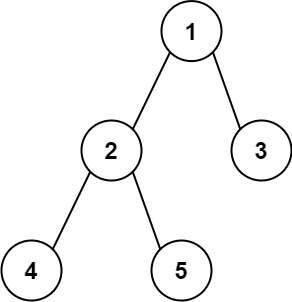LeetCode-in-All
543. Diameter of Binary Tree
Easy
Given the root of a binary tree, return the length of the diameter of the tree.
The diameter of a binary tree is the length of the longest path between any two nodes in a tree. This path may or may not pass through the root.
The length of a path between two nodes is represented by the number of edges between them.
Example 1:

Input: root = [1,2,3,4,5]
Output: 3
Explanation: 3 is the length of the path [4,2,1,3] or [5,2,1,3].
Example 2:
Input: root = [1,2]
Output: 1
Constraints:
- The number of nodes in the tree is in the range
[1, 104]. -100 <= Node.val <= 100
Solution
#include <stdio.h>
#include <stdlib.h>
/**
* Definition for a binary tree node.
* struct TreeNode {
* int val;
* struct TreeNode *left;
* struct TreeNode *right;
* };
*/
// Global variable to store the maximum diameter
int diameter;
// Helper function to calculate the diameter of the binary tree
int diameterOfBinaryTreeUtil(struct TreeNode* root) {
if (root == NULL) {
return 0;
}
// Calculate left and right path lengths
int leftLength = root->left ? 1 + diameterOfBinaryTreeUtil(root->left) : 0;
int rightLength = root->right ? 1 + diameterOfBinaryTreeUtil(root->right) : 0;
// Update the diameter if the path through this node is larger
if (leftLength + rightLength > diameter) {
diameter = leftLength + rightLength;
}
// Return the maximum path length from this node
return leftLength > rightLength ? leftLength : rightLength;
}
// Main function to find the diameter of the binary tree
int diameterOfBinaryTree(struct TreeNode* root) {
diameter = 0; // Initialize diameter to 0
diameterOfBinaryTreeUtil(root); // Calculate diameter using the utility function
return diameter;
}

